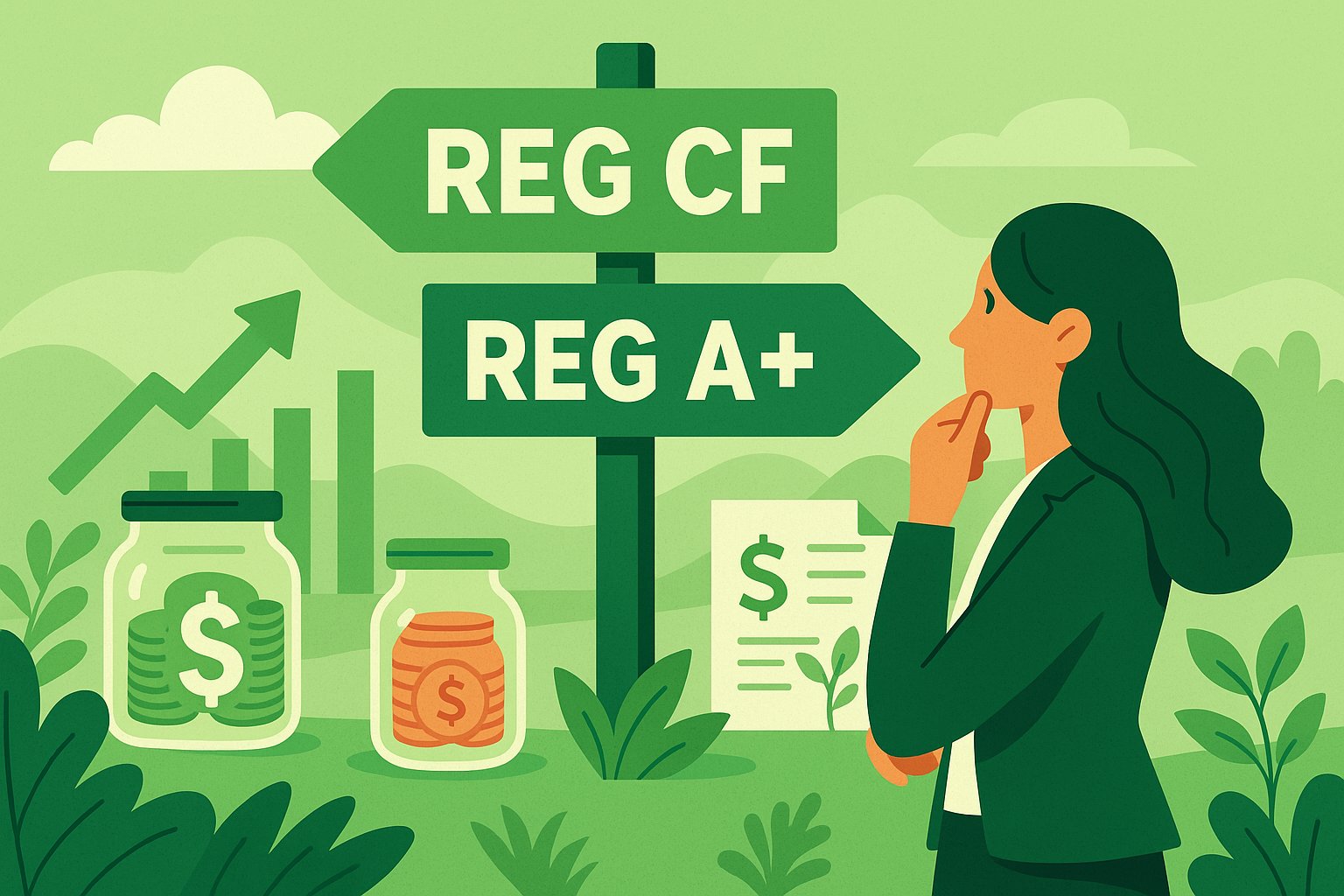The SEC’s Pivotal Role in Equity Crowdfunding
Equity crowdfunding has unleashed a wave of democratized finance, permitting everyday investors to back emerging startups and small businesses alongside seasoned venture capitalists. Yet beneath the surface of this democratization lies a critical guardian: the Securities and Exchange Commission (SEC). Tasked with balancing investor protection and capital formation, the SEC crafted the framework for Regulation Crowdfunding (Reg CF) under the JOBS Act of 2012. This opening exploration goes deep into how the SEC’s rules, oversight, and guidance shape every facet of equity crowdfunding—from which companies qualify to the disclosures they must make and the enforcement actions that keep the ecosystem honest. By understanding the SEC’s central role, both entrepreneurs and investors can navigate crowdfunding offerings with clarity, confidence, and compliance at the forefront.
At its core, the SEC serves two intertwined missions in equity crowdfunding. First, it promotes capital formation by carving out exemptions that streamline the fundraising process for startups while broadening access to capital markets. Second, it safeguards retail investors—many of whom lack the resources and expertise of institutional players—against fraud, misrepresentation, and undue risk. The tension between these objectives is evident in Reg CF’s design: raising caps that have grown from $1 million to $5 million annually, thresholds for audited financials, investment limits tied to personal income and net worth, and rigorous disclosure mandates. These measures calibrate risk in an inherently speculative arena, empowering investors with information while giving founders a clear path to raise essential growth capital.
In the sections that follow, we’ll trace the SEC’s evolution from passive observer of crowdfunding initiatives to active architect of modern Reg CF. We’ll unpack the agency’s rulemaking process, dissect the registration and reporting requirements it enforces, examine how exemptions offer both flexibility and guardrails, and illuminate the enforcement mechanisms that deter bad actors. Along the way, you’ll discover how the SEC collaborates with FINRA and state securities regulators to maintain a cohesive regulatory tapestry, and how ongoing guidance initiatives help demystify complex rules for real-world issuers and backers. By the end, you’ll appreciate not only the SEC’s legal authority but also its vital role as steward of trust and transparency in the burgeoning world of equity crowdfunding.
From JOBS Act to Reg CF: The SEC’s Rulemaking Odyssey
The genesis of modern equity crowdfunding traces back to the 2012 Jumpstart Our Business Startups (JOBS) Act, a landmark law aimed at easing capital formation for small businesses. Section 302 of the JOBS Act mandated that the SEC explore exemptions allowing non-accredited investors to purchase securities in private companies. Over the next four years, the SEC undertook an exhaustive rulemaking process—soliciting public comment, engaging with industry stakeholders, and evaluating risk trade-offs. In October 2015, the Commission adopted Regulation Crowdfunding, codified in Rule 227 and Form C disclosures, which took effect in May 2016.
This rulemaking journey underscored the SEC’s commitment to evidence-based regulation. Staff whitepapers and economic analyses assessed investor sophistication, market size, and fraud prevalence, informing critical decisions on offering caps, disclosure thresholds, and audit requirements. The initial $1.07 million annual fundraising cap reflected cautious optimism, balancing growth needs with investor safety. As the market matured and empirical data revealed responsible issuer behavior and minimal fraud, the SEC revisited Reg CF in 2020–2021, raising the cap to $5 million and easing financial statement burdens for smaller raises. This iterative rulemaking illustrates the SEC’s adaptive stance—calibrating regulations in response to real-world performance while staying true to its twin missions of facilitation and protection.
Architect of Exemptions: Carving Out Reg CF’s Safe Harbor
Under the Securities Act of 1933, companies must register securities offerings with detailed disclosures unless an exemption applies. The SEC used its authority under Section 4(a)(6) to create Reg CF’s safe-harbor framework, enabling eligible issuers to raise limited capital without full-scale registration. Defining eligible companies, the SEC excluded certain issuers—such as reporting companies, foreign issuers, and bad actors—to mitigate complexity and fraud risks. It also set fundraising thresholds, ownership limits, and investor caps, crafting a bespoke exemption tailored to the realities of startup finance and retail investor participation.
Within this exemptive regime, the SEC laid out precise rules for offering platforms, mandating that capital raises occur exclusively on SEC-registered funding portals or broker-dealers. These intermediaries bear compliance responsibilities, such as preliminary investor suitability checks, portal registration, and marketing self-regulation. This dual-layered structure—issuer obligations under Form C and platform guardrails under Broker-Dealer and Funding Portal rules—ensures that Reg CF offerings operate within a controlled, transparent marketplace, where both issuers and intermediaries contribute to a cohesive compliance ecosystem.
Disclosure as a Cornerstone: Standardized Form C Requirements
Transparency lies at the heart of the SEC’s investor protection mandate, and Reg CF’s Form C is the linchpin of this requirement. Through Form C, issuers disclose critical information: business descriptions, use-of-proceeds, capitalization tables, officer and director backgrounds, related-party transactions, and detailed financial statements. The SEC specified graduated financial-reporting rules—allowing owner-certified statements for raises up to $107,000, reviewed statements up to $535,000, and fully audited statements for offerings up to $5 million—ensuring that larger capital raises carry commensurate assurance levels.
The uniform structure of Form C serves multiple purposes. It enables investors to compare offerings on an apples-to-apples basis, streamlining due diligence across disparate sectors. It also facilitates SEC oversight, as staff can efficiently review filings for consistency, completeness, and red flags. Moreover, Form C’s electronic filing on the EDGAR system democratizes access: retail investors can query a company’s disclosures directly, fostering an informed marketplace where investor decisions rest on a solid foundation of verifiable facts.
Enforcing the Rules: The SEC’s Compliance and Inspection Powers
Rulemaking and disclosure alone cannot curb misconduct; enforcement is equally vital. The SEC wields broad powers to investigate potential violations of Reg CF’s antifraud provisions, disclosure omissions, or platform noncompliance. When red flags arise—such as materially misleading statements in Form C, undisclosed related-party transactions, or unregistered facilitation by an intermediary—the SEC can launch examinations, issue subpoenas, and negotiate settlements. Enforcement actions may result in disgorgement of ill-gotten gains, civil monetary penalties, and injunctions against future violations.
Beyond reactive enforcement, the SEC conducts periodic inspections of registered funding portals under its oversight authority and, in coordination with FINRA, reviews broker-dealer compliance. These inspections probe internal controls, compliance manuals, marketing practices, and investor-suitability procedures. By publicly highlighting deficiencies and successful enforcement actions, the SEC sends a clear message: equity crowdfunding is a regulated activity, and adherence to both technical rules and antifraud principles is non-negotiable.
Investor Limits and Protections: Calibrating Retail Participation
Recognizing the speculative nature of early-stage investing, the SEC carefully calibrated investor contribution limits under Reg CF. These limits—based on annual income and net worth—prevent individual backers from overexposure to high-risk ventures. The SEC also imposed restrictions on rolling 12-month investment windows, ensuring that retail investors manage cumulative crowdfunding exposure. These measures reflect the SEC’s duty to shield unsophisticated participants from catastrophic losses, while still allowing meaningful participation in equity raises.
Complementing financial caps, the SEC mandated key investor protections: anti-fraud warranties, statutory withdrawal rights (allowing investors to cancel pledges up until the offering closes), and whistleblower hotlines. These provisions empower backers to assert their rights and hold issuers accountable if misrepresentations or unfair practices occur. By embedding these protective mechanisms in the regulatory fabric, the SEC strikes a balance between market access and risk containment—a hallmark of prudent retail-investor regulation.
Platform Oversight: The Funding Portal and Broker-Dealer Framework
Equity crowdfunding offerings cannot occur in a regulatory vacuum; they require a controlled venue. The SEC, through Rule 3a80-1 and on Form Funding Portal, created a bespoke registration system for funding portals—digital platforms that connect issuers with investors. These portals must register with the SEC and become members of FINRA, adhere to capital and bonding requirements, and maintain compliance programs addressing anti-money laundering, cybersecurity, and customer-support obligations. Notably, funding portals are prohibited from offering investment advice, soliciting purchases or sales, or handling investor funds directly; this delineation preserves clarity in roles and limits conflicts of interest.
Broker-dealers, already subject to robust regulatory frameworks, may also operate Reg CF offerings. Their participation brings the added weight of prospectus-like responsibilities, such as customer suitability determinations and fair-dealing obligations. The existence of two complementary pathways—funding portals for streamlined operations and broker-dealers for more traditional securities intermediation—broadens the ecosystem while ensuring that each intermediary operates under rigorous SEC and FINRA scrutiny.
State-Level Synchronization: Harmonizing Blue Sky Requirements
While Reg CF provides a federal exemption from registration, state securities laws (“Blue Sky” laws) still apply. To reduce complexity, the SEC’s Reg CF rule preempts much of state registration, but many states require filing notice forms and administrative fees. The SEC coordinated with state regulators through the North American Securities Administrators Association (NASAA) to develop coordinated form templates, making it easier for issuers to satisfy multiple jurisdictions simultaneously.
This harmonization exemplifies the SEC’s cooperative federalism approach: by streamlining multi-state filings and fostering consistent standards, the SEC curbs issuer burden without relinquishing investor protection at the state level. Issuers benefit from predictable procedures and single-form submissions, while state regulators maintain their complementary oversight role—reviewing offerings for local concerns and investor complaints. This layered regulatory framework ensures that equity crowdfunding remains accessible yet accountable across every corner of the country.
Educating and Empowering: SEC Guidance and Investor Alerts
Even the most thoughtfully drafted rules fail without effective education. To bridge the knowledge gap, the SEC’s Office of Investor Education and Advocacy publishes guides, FAQs, and investor alerts specific to crowdfunding. These resources explain how to evaluate Reg CF offerings, calculate investment caps, recognize warning signs of fraud, and navigate portal features. The SEC also hosts public roundtables and issues staff bulletins clarifying ambiguities—for example, definitions of “general solicitation” or treatment of tokenized securities under evolving guidance.
This emphasis on education bolsters the SEC’s protective mission by equipping investors with the tools to ask informed questions and spot red flags. For issuers, clear guidance reduces inadvertent noncompliance and levels the playing field, especially for first-time participants. By combining formal rulemaking with ongoing interpretive support, the SEC fosters a culture of continuous learning—essential in a fast-evolving market segment.
Looking Ahead: Emerging Challenges and Regulatory Evolution
The equity crowdfunding landscape continues to shift, driven by technological innovation, market feedback, and broader capital-market trends. The SEC monitors developments such as tokenized securities on blockchain platforms, hybrid debt-equity instruments, and secondary trading platforms that promise increased liquidity. Each innovation tests the boundaries of existing securities laws, prompting the SEC to weigh whether new rules, interpretive guidance, or enforcement priorities are needed.
At the same time, political and economic pressures may influence future legislative or regulatory adjustments. Proposals to raise offering caps further, modify investor accreditation standards, or expand crowdfunding to charitable and real-estate verticals could reshape the ecosystem. Through its rulemaking dockets, public statements, and empirical analyses, the SEC will guide this evolution—always striving to harmonize its dual objectives of capital formation and investor protection.
The SEC as Steward of Trust and Transparency
In the tapestry of equity crowdfunding, the SEC emerges as both architect and guardian—designing the regulatory framework, enforcing its tenets, and illuminating the path for all participants. By crafting exemptions under Reg CF, mandating robust disclosures, overseeing funding portals and broker-dealers, and coordinating with state regulators, the SEC underpins a marketplace where everyday investors can back startups responsibly. Its ongoing commitment to education, adaptive rulemaking, and vigilant enforcement ensures that crowdfunding evolves with integrity, resilience, and inclusivity.
For founders and backers alike, appreciating the SEC’s role is not merely a matter of legal compliance; it’s an invitation to participate in a trusted, transparent ecosystem. Armed with knowledge of the SEC’s rulemaking rationale, disclosure requirements, and enforcement mechanisms, stakeholders can approach equity crowdfunding with both excitement and prudence—confident that the regulatory foundations laid by the SEC will sustain a vibrant, dynamic, and equitable capital market for years to come.




